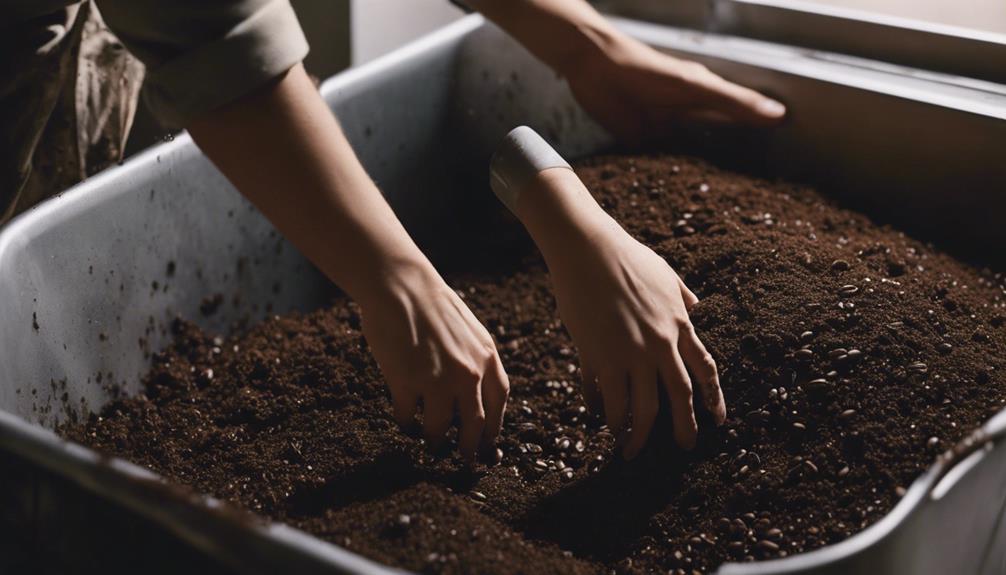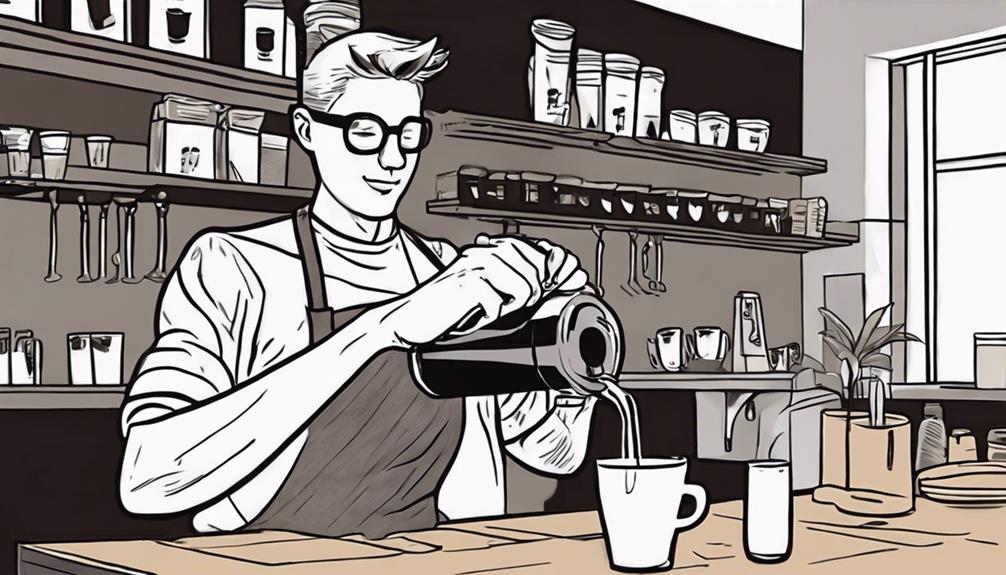Do you often find yourself dealing with unpleasant coffee breath after enjoying your morning cup of coffee? After drinking coffee, make sure to brush your teeth to get rid of any residue. Keep some sugar-free gum on hand to quickly freshen up your breath. Rinse your mouth with water to wash away any remnants of coffee. Chewing sugar-free gum can help stimulate saliva production and prevent the growth of bacteria. Looking for more tips on how to keep your breath fresh and free from coffee odor? Find out how to avoid coffee breath completely by opting for a less acidic coffee blend or adding a splash of milk to neutralize the acidity. You could also switch to green tea or herbal infusions as alternatives. Don’t forget to stay hydrated throughout the day to promote good oral hygiene and reduce coffee breath. Remember to brush your tongue as well, as bacteria can accumulate there and contribute to bad breath. Additionally, try to limit your coffee intake to prevent mouth dryness and the buildup of odor-causing bacteria. Lastly, consider using a tongue scraper to eliminate any lingering residue on your tongue and maintain fresh breath.
Key Takeaways
- Brush teeth post-coffee to remove residue.
- Use sugar-free gum or mints to mask odor.
- Rinse with water to wash away coffee remnants.
- Drink water or chew parsley to neutralize breath.
- Consider caffeine-free teas as coffee alternatives.
Causes of Coffee Breath
If you're wondering why your breath smells like coffee, it's important to understand the key causes of coffee breath. When you indulge in your favorite brew, the high acidity of coffee can upset the pH balance in your mouth, creating an environment where bacteria thrive. These bacteria release volatile sulfur compounds, which contribute to that distinct coffee breath odor.
Additionally, the process of roasting coffee beans forms sulfur-containing aroma compounds that linger in your mouth post-sip. Moreover, caffeine, a staple in coffee, has a dehydrating effect, leading to dry mouth. This lack of saliva production is further exacerbated by tannins present in coffee, which bind to proteins in saliva and hinder its natural moisturizing properties.
Consequently, the combination of bacteria-produced sulfur compounds, sulfur-containing aroma compounds from coffee, the acidity of coffee, and the drying effects of caffeine and tannins all play a role in creating that less-than-pleasant coffee breath you may experience.
Ways to Get Rid of Coffee Breath

To combat coffee breath effectively, remember to:
- Brush your teeth after drinking coffee.
- Use sugar-free gum or mints to freshen your breath.
- Make sure to gargle with mouthwash.
These simple steps can help eliminate the odor and keep your breath smelling fresh throughout the day.
Brushing After Coffee
Regularly brushing after drinking coffee helps eliminate coffee residue, prevent bacteria growth, and improve oral hygiene to combat coffee breath effectively.
When brushing after coffee, make sure to use toothpaste with zinc or clove oil to neutralize coffee breath odors effectively. These ingredients can help freshen your breath by targeting the compounds that cause the coffee smell.
By incorporating this practice into your routine, you can prevent bacteria growth in your mouth, which is essential for avoiding bad breath. Additionally, brushing after coffee consumption not only removes coffee residue from your teeth and tongue but also aids in preventing staining and maintaining fresh breath throughout the day.
Sugar-Free Gum Option
How can chewing sugar-free gum after coffee help combat coffee breath effectively?
Chewing sugar-free gum stimulates saliva production, which can alleviate dry mouth, a common side effect of coffee consumption. The increased saliva flow helps wash away leftover coffee residue on teeth, preventing the growth of odor-causing bacteria. Look for gums containing Xylitol, a natural sweetener that not only adds a touch of sweetness but also inhibits bacteria growth in the mouth, contributing to fresher breath.
Opt for sugar-free gum with natural breath-freshening ingredients like mint or cinnamon for an extra burst of freshness.
Taking just 20 minutes to chew sugar-free gum after your morning cup of coffee can go a long way in maintaining a clean and fresh mouth throughout the day. By incorporating this simple habit into your routine, you can effectively combat coffee breath and feel more confident in your interactions.
Gargling With Mouthwash
Chewing sugar-free gum can effectively combat coffee breath, but another way to invigorate your breath after coffee is by gargling with mouthwash. Gargling with mouthwash helps eliminate bacteria in the mouth that cause bad breath.
Consider these benefits of incorporating mouthwash into your oral hygiene routine:
- Mouthwash can reach areas of the mouth that brushing and flossing may miss, ensuring a thorough clean.
- Alcohol-free mouthwash can help prevent dry mouth, a common side effect of coffee consumption, by keeping your mouth moisturized.
- Mouthwash with zinc or chlorine dioxide can neutralize sulfur compounds that contribute to bad breath, combating the root cause of coffee breath.
- Using mouthwash after coffee can provide a revitalizing feeling and help maintain oral hygiene throughout the day.
Make sure to incorporate this simple step into your daily routine to keep your breath fresh and your mouth healthy.
Tips to Avoid Coffee Breath

To steer clear of coffee breath, remember to rinse with water after your coffee fix, as it helps cleanse your mouth.
Make sure to stick to your brushing routine post-coffee to eliminate residue and odor.
Keep sugar-free gum handy for a quick breath refresh after enjoying your favorite brew.
Water Rinse Post-Coffee
After enjoying your cup of coffee, remember to rinse your mouth with water to combat coffee breath effectively. Here's why a water rinse post-coffee is important for maintaining fresh breath and good oral hygiene:
- Washes Away Coffee Residue: Rinsing with water helps remove any remaining coffee particles that can adhere to your teeth and tongue.
- Prevents Bacteria Growth: Water rinses help eliminate the conditions where bacteria thrive, reducing the chances of bad breath.
- Neutralizes Acidity: Water can help balance the acidity from coffee, which is known to contribute to unpleasant odors.
- Promotes Saliva Production: Drinking water after coffee can stimulate saliva flow, preventing dry mouth and aiding in keeping breath fresh.
A quick swish of water in your mouth can make a significant difference in combating coffee breath and maintaining ideal oral health. So, don't forget to grab a glass of water after your morning brew!
Brushing Routine Importance
For fresher breath and improved oral health, incorporating a consistent brushing routine is essential in combating coffee breath effectively. Brushing your teeth after drinking coffee helps remove coffee residue and bacteria that cause bad breath. It also prevents coffee stains on teeth, maintaining oral hygiene. Using fluoride toothpaste strengthens tooth enamel and fights bad breath. Don't forget to brush your tongue as well; it helps eliminate odor-causing bacteria and freshens breath. To enhance your brushing routine further, consider adding mouthwash. Mouthwash can reduce bacteria in the mouth, contributing to combating coffee breath effectively.
| Importance of Brushing Routine | Benefits |
|---|---|
| Removes coffee residue | Fresher breath |
| Fights bacteria | Prevents bad breath |
| Maintains oral hygiene | Prevents coffee stains |
| Strengthens tooth enamel | Freshens breath |
Sugar-Free Gum Refreshment
Consider incorporating sugar-free gum into your routine as an invigorating way to combat coffee breath effectively. Chewing sugar-free gum stimulates saliva production, which helps wash away coffee residue and reduces bad breath.
Here are some benefits of using sugar-free gum:
- Saliva Production: Stimulates saliva flow, aiding in washing away coffee residue.
- Freshening: Masks coffee breath temporarily with mint or other flavors.
- Dislodging: Helps dislodge food particles and bacteria that contribute to bad breath.
- Dental Health: Opting for sugar-free gum prevents prolonged exposure to sugars, reducing dental issues and bad breath.
Opt for sugar-free gum as a portable solution to combat coffee breath on the go. With its ability to freshen breath, stimulate saliva production, and dislodge food particles, sugar-free gum offers a convenient way to maintain oral hygiene and combat the effects of coffee on your breath throughout the day.
Alternatives to Coffee

Switching to high-caffeine black or chai tea can be effective alternatives to coffee if you want to avoid coffee breath. Black tea provides a robust flavor and a caffeine kick without the concern of coffee breath.
Chai tea, with its blend of spices, offers a flavorful option that can help invigorate your breath after enjoying a cup. For those seeking a coffee-like taste without the breath repercussions, caffeine-free chicory root coffee is a suitable substitute.
Yerba mate herbal tea is another choice that provides caffeine but doesn't come with the risk of coffee breath. Matcha green tea not only offers a caffeine boost but also potentially helps revitalize your breath.
Herbal teas like peppermint or ginger can be invigorating alternatives that not only taste great but can also contribute to keeping your breath smelling pleasant throughout the day. Try these options to enjoy your morning cup without worrying about coffee breath.
Why Coffee Impacts Your Breath

Coffee impacts your breath due to the sulfuric compounds, acidity, caffeine-induced dry mouth, bacterial activity, and tannins present in this popular beverage.
When you consume coffee, several factors come into play that contribute to bad breath:
- Sulfuric Compounds: Coffee contains sulfuric compounds that can lead to the release of unpleasant odors in your breath.
- Acidity: The acidity in coffee can disrupt the natural pH balance in your mouth, creating an environment conducive to odorous bacteria growth.
- Caffeine-Induced Dry Mouth: Caffeine in coffee can result in dry mouth, reducing saliva production, which normally helps cleanse the mouth and neutralize acids.
- Bacterial Activity: Bacteria in your mouth feed on sugars in coffee, releasing sulfur compounds that can cause bad breath.
Understanding how these elements in coffee impact your oral health can help you take steps to mitigate coffee breath effectively.
Tips for Freshening Coffee Breath

To combat coffee breath, incorporating oral hygiene practices and consuming breath-freshening remedies can help alleviate the odor. After enjoying your morning cup of black coffee, consider these tips to keep your breath fresh:
| Tip | Description |
|---|---|
| Brushing Teeth | Brushing your teeth after coffee helps remove residue and freshen breath. |
| Sugar-Free Breath Mint | Use sugar-free breath mints or gum to mask coffee breath temporarily. |
| Mouthwash | Gargling with mouthwash can kill bacteria and reduce odor. |
| Fresh Parsley | Chewing on fresh parsley or drinking water can neutralize coffee breath. |
About the Practice

Consider scheduling an appointment with D & G Dental Of West Orange for thorough dental services in West Orange. The practice offers extensive dental services focused on maintaining long-term oral health and overall well-being. Here's what you can expect:
- Checkups and Cleanings: Regular examinations and professional cleanings to keep your oral health in check.
- Periodontal Therapy: Specialized treatments for gum disease to maintain the health of your gums.
- Dental Technology: State-of-the-art tools and techniques used for advanced and precise care.
- Comprehensive Dental Services: A wide range of services to address all your dental needs under one roof.
For exceptional oral care in West Orange, D & G Dental Of West Orange is dedicated to providing you with the best possible treatment using the latest dental technology. Contact them today to learn more about their services or to schedule an appointment.
How SmartMouth Eliminates Bad Breath

SmartMouth mouthwash tackles bad breath by utilizing zinc ions to block bacteria from producing sulfur gas, a common culprit for oral odor. This innovative approach eliminates the root cause of bad breath, providing you with long-lasting fresh breath.
The two-liquid formula of SmartMouth works efficiently to destroy existing sulfur gases while also preventing the release of more sulfur gas by bacteria in your mouth. By incorporating this mouthwash into your daily oral hygiene routine, you can enjoy up to 24 hours of protection against bad breath.
SmartMouth's advanced technology goes beyond just masking odors; it stops bacteria from metabolizing protein particles, effectively halting sulfur gas production. With SmartMouth, you can confidently combat bad breath and maintain a clean and fresh oral environment throughout the day.
Say goodbye to coffee breath and hello to long-lasting freshness with SmartMouth mouthwash.
Frequently Asked Questions
How Do You Get Rid of Coffee Breath in the Morning?
Want fresh breath in the morning after coffee? Brush teeth, use sugar-free gum, gargle mouthwash, drink water, or switch to black coffee. These habits eliminate coffee breath, keeping your breath clean and fresh all day.
How Do I Make My Breath Not Smell in the Morning?
To make your breath fresh in the morning, brush your teeth and tongue well, drink water to rinse your mouth, use sugar-free gum or mints, scrape your tongue, and avoid sulfur and garlic foods.
How Can I Freshen My Breath After Breakfast?
Perk up post-breakfast breath by brushing, scraping, sipping, chewing, and rinsing. Freshen up after your morning cup of coffee with these simple steps to keep bad breath at bay throughout the day.
Why Does My Breath Smell After Drinking Coffee?
Your breath smells after drinking coffee due to sulfuric compounds, acids, caffeine, and bacteria in your mouth. These elements lead to dry mouth, reduced saliva production, and the release of volatile sulfur compounds causing odor.
Conclusion
So there you have it – no more worrying about coffee breath ruining your day!
By following these simple tips and tricks, you can enjoy your morning cup of coffee without the fear of bad breath. Avoiding caffeine addiction is essential in ensuring that you can still enjoy your morning cup of coffee without any negative effects. One way to do this is by limiting yourself to only one or two cups a day. Additionally, try to opt for decaffeinated versions of your favorite coffee drinks to reduce your overall caffeine intake. By being mindful of your consumption, you can still savor your coffee without the worry of bad breath.
Remember, the early bird catches the worm, but you don't have to suffer from coffee breath to do so.
Stay fresh and confident all day long with these easy solutions!









